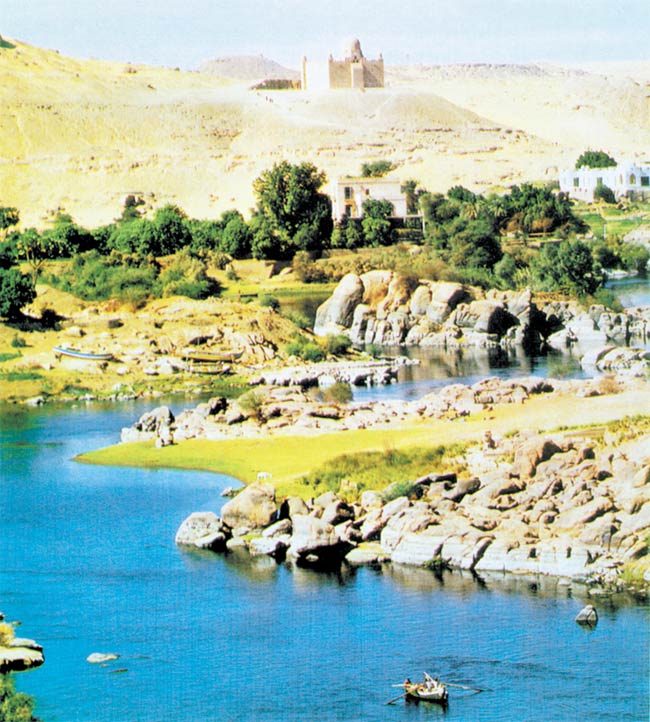Depravity in Some of the People Among the Children of Israel
After his confrontation with people gathered by Pharaoh, the Prophet Moses (pbuh) stayed in Egypt for an extended period of time, marked by more severe oppression meted out by Pharaoh against the Prophet Moses (pbuh) and the Children of Israel. On one hand, the Prophet Moses (pbuh) confronted Pharaoh and his oppression, while on the other, he summoned the Children of the Israel to steadfastness. Some among the Children of the Israel displayed an attitude incompatible with respect towards the Prophet Moses (pbuh), saying that his presence did not alleviate the repression they were subjected to. Allah relates this wicked attitude of these people as follows:
Moses said to his people, "Seek help in Allah and be steadfast. The Earth belongs to Allah. He bequeaths it to any of His servants He wills. The successful outcome is for those who have fear for Allah."
They said, "We suffered harm before you came to us and after you came to us."
He said, "It may well be that your Lord is going to destroy your enemy and make you the successors in the land so that He can see how you behave." (Surat al-Araf: 128-129)
This wicked attitude of ome of the Children of Israel towards the Prophet Moses (pbuh) is an indication of their spiritual weakness. By sending a prophetto save them from the cruelty of Pharaoh, Allah favored them and asked them to be steadfast. Due to the weakness of their faith and their utter lack of wisdom, they were not able to forebear. They showed the kind of attitude towards the Prophet Moses (pbuh) which is incompatible with respect. However, no matter what befalls him, a sincere believer feels grateful to Allah, and submits himself to everything that Allah had predetermined for him. In times of trouble, hardship, hunger or even under oppression or torture, a Muslim must always be in such a state of spiritual submission. This state of mind was explained by Allah's Messenger, the Prophet Muhammad (May Allah bless him and grant him peace) with the words "Praise be to Allah Who created everything as is necessary, who does not hasten anything He defers and determines. Allah is enough for me and sufficient." (Ibn Majah) Only such submission and putting one's trust in Allah can change troubles into great spiritual blessings.
With the example of the Prophet Moses (pbuh), Allah shows us that the majority of the Children of Israel lacked moral perfection and the profundity of faith. As Allah. Allah informs us of these events that we may take lessons from them. Just as in the case of the denial of Pharaoh, so in the weak faith and ill-hearts of some of the Children of Israel is there a lesson for us.
 |
| The River Nile |
- Introduction
- Sovereignty of Pharaoh in Egypt and the Condition of the Children of Israel
- Birth of the Prophet Moses (pbuh)
- The Prophet Moses (pbuh) Departs from Egypt
- Entrance Into the Country of Midian and His Settlement There
- Arrival at the Valley of Tuwa and the First Revelation
- Allah's Discourse with the Prophet Moses (pbuh)
- The Prophet Moses (pbuh) Requests the Prophet Aaron (pbuh) as a Companion
- The Story of the Prophet Moses (pbuh) and the Mystery of Destiny
- Conveying the Message to Pharaoh and the Proper Manner To Communicate It
- The Corrupted Reasoning of Pharaoh
- Signs to the End Times from the Story of the Prophet Moses (pbuh)
- Titles of Egyptian Rulers in the Qur'an
- The Struggle of the Prophet Moses (pbuh) Against the Magicians
- The Prophet Moses (pbuh) Demolished the Idol of His Time
- Some of Pharaoh's Court Embrace Faith
- A Man of Faith in the Palace
- Depravity in Some of the People Among the Children of Israel
- The Period of Disasters and the Folly of Pharaoh
- Exodus from Egypt and the Drowning of Pharaoh in the Sea
- The Arrogance of Karun and His Punishment
- Some Members of the Tribe of the Prophet Moses (pbuh) Stray and Worship the Golden Calf
- Perverse Conduct of Some of the People Among the Children of Israel
- The Prophet Moses (pbuh) and a Learned Man
- Conclusion
